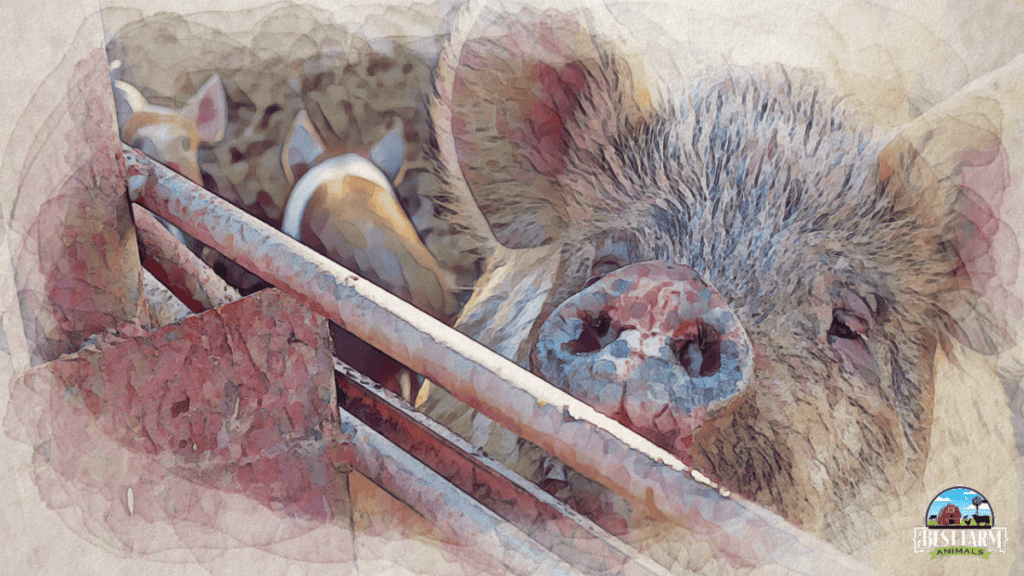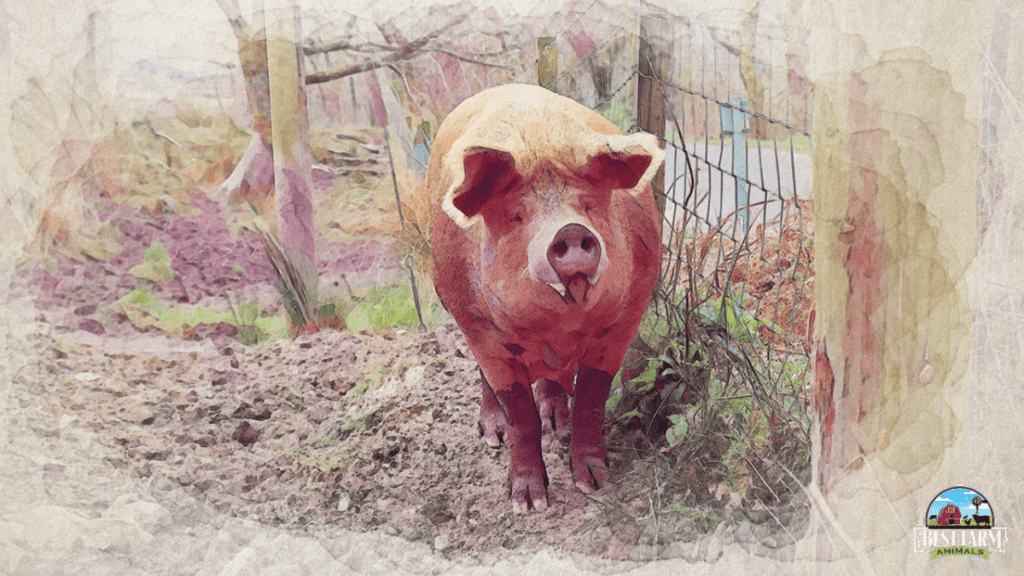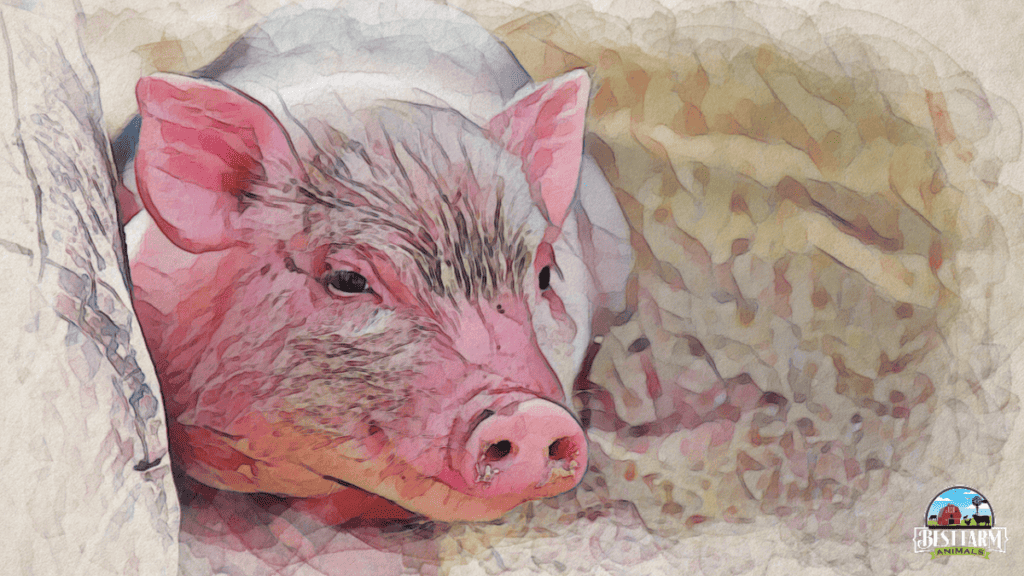Table of Contents
Common Reasons Why Pigs Don’t Eat
A pig will stop eating for a variety of reasons. This can include a variety of things, such as the food being supplied or the pig’s health. Let’s look at a few typical explanations for why pigs may lose appetite or refuse to eat.
1. Dehydration Causes Lethargy in Pigs And Refusal to Eat
Dehydration in pigs can lead to lethargy and loss of appetite due to restricted access to clean water. It can cause electrolyte imbalances, affecting organs and causing weariness. Dehydration may also reduce blood flow to the brain, resulting in difficulty concentrating and lack of motivation to eat.
Additionally, it can decrease digestive enzymes and acids, leading to digestive problems. Other factors like worms, parasites, bacteria, stress, extreme weather conditions, ulcers, and infections can also contribute to pig lethargy and decreased appetite.
2. Liver Disease Can Cause a Loss of Appetite
If a pig shows a lack of appetite but drinks water normally, it could be a sign of renal or liver disease. Stress or nutritional imbalances could also be contributing factors. Pigs may not eat if they are already full or dislike the food, but they will still drink water.
Regardless, it is important to consult a veterinarian if a pig is dehydrated or has an underlying illness that affects its eating habits.
3. Shivering Pigs Can Lose Their Desire to Eat
Pigs are sensitive to extreme temperatures and may shiver and lose appetite in cold weather. Shivering helps generate body heat, but it diverts energy from eating.
In extreme cold, a pig’s metabolism slows down, reducing energy and appetite. In prolonged cold temperatures, feeding alone cannot fix the negative energy balance, which can lead to stunted growth and weight loss.
If your pig is shivering and it’s not cold, be sure to read about other reasons pigs shiver and shake.

4. Sick Pigs Won’t Eat and Will Be Lethargic
Illness in pigs can cause loss of appetite and digestive problems, leading to disinterest in food. Infections, inflammation, organ damage, stress, and digestive issues can all contribute to a sick pig not eating.
Taking abnormal eating behavior seriously is important and consult a veterinarian for diagnosis. X-rays, fecal exams, blood work, and physical exams help identify the issue. The vet will create a treatment plan, which may include medication, surgery, or dietary changes, to restore the pig’s health and appetite.
5. My Pig Doesn’t Eat and Has Diarrhea
When a pig is ill, it may lose appetite and struggle with food digestion, resulting in a lack of interest in eating. This could indicate infections, inflammation, organ damage, stress, or digestive issues.
Prompt veterinary attention is crucial to diagnose the problem using exams and tests like X-rays and blood work. Treatment may involve medication, surgery, or dietary adjustments to restore the pig’s health and appetite.
6. Vomiting Pigs Stop Eating
A pig not eating and vomiting could indicate a severe illness or ingestion of a toxic substance. Infections like salmonellosis or swine dysentery are common causes. Intestinal parasites, gastric ulcers, intestinal blockage, mold ingestion, or dietary issues may also be responsible. Immediate veterinary attention is necessary in such cases.
7. Shaking Pigs Stop Eating
When a pig is not eating and shaking, it can indicate fear, cold, pain, stress, or an underlying medical issue. Distress or pain can result in loss of appetite. Shaking in pigs may be due to fever or dehydration, which also affects their appetite.
Shaking without eating in piglets could suggest anemia, nutrient deficiencies, overactive thyroid, worms, or other conditions impacting their mental, immune, and digestive systems.

Medicines for a Pig That’s Not Eating
Antibiotics are the standard therapy for treating a pig not eating for bacterial or viral reasons. Broad-spectrum antibiotics are commonly used to treat pig diseases such as bacterial pneumonia and erysipelas.
- Tylan 200 Tylosin
- Duramycin 72-200
- Lincomix 300
- Oxytetracycline
I use the first two injections on both swine and cattle.
Your veterinarian may recommend levamisole or pyrantel pamoate if roundworms, coccidia, giardia, or other parasites are the underlying cause. Medication containing pectin and ranitidine, which are digestive aids, can assist pigs not eating due to acid reflux or colic.
For piglets that can’t eat due to shivering related to anemia, I usually administer Iron Dextran.
The medicine you give a pig when they are not eating depends on the underlying cause of its loss of appetite. However, always consult a vet for the correct diagnosis and proper prescription.
Check out this resource for everything about Caring for Your Pig.
My Most Used Pig Supplies
This list contains affiliate products. Affiliate products do not cost more but helps to support BestFarmAnimals and our goal to provide farm animal owners with accurate and helpful information.
Purina Pig Chow will last well (or Mazuri is popular, but I haven’t tried it), and the stainless steel non-skid bowls that will help keep the mess down.
A pig blanket to keep her warm. This one also has bright colors and helps to provide rooting without the destruction.
Pig Harness for walking and handling your pig. There are a lot to choose from, but this one is pretty easy to use. If you want one that has a separate leash, this looks like a good one.
A large crate for keeping her safe in your house at night and when you leave the house. This is essential. You’ll also want a litterbox, and I like mine with a lid for nighttime. Pine shavings are best, and you may be able to find them in larger quantities locally.
When you have accidents, Odoban will help eliminate odors. When you are potty training, these floor pads work great for keeping your house clean while training her to go in certain places.
You’ll also want an outdoor house to keep her warm when she gets outside time, an essential part of her development.
Dewormer- Ivermectin is the primary dewormer I use, although I do rotate with a non-ivermect ingredient once so that the worms don’t get immune to it.

